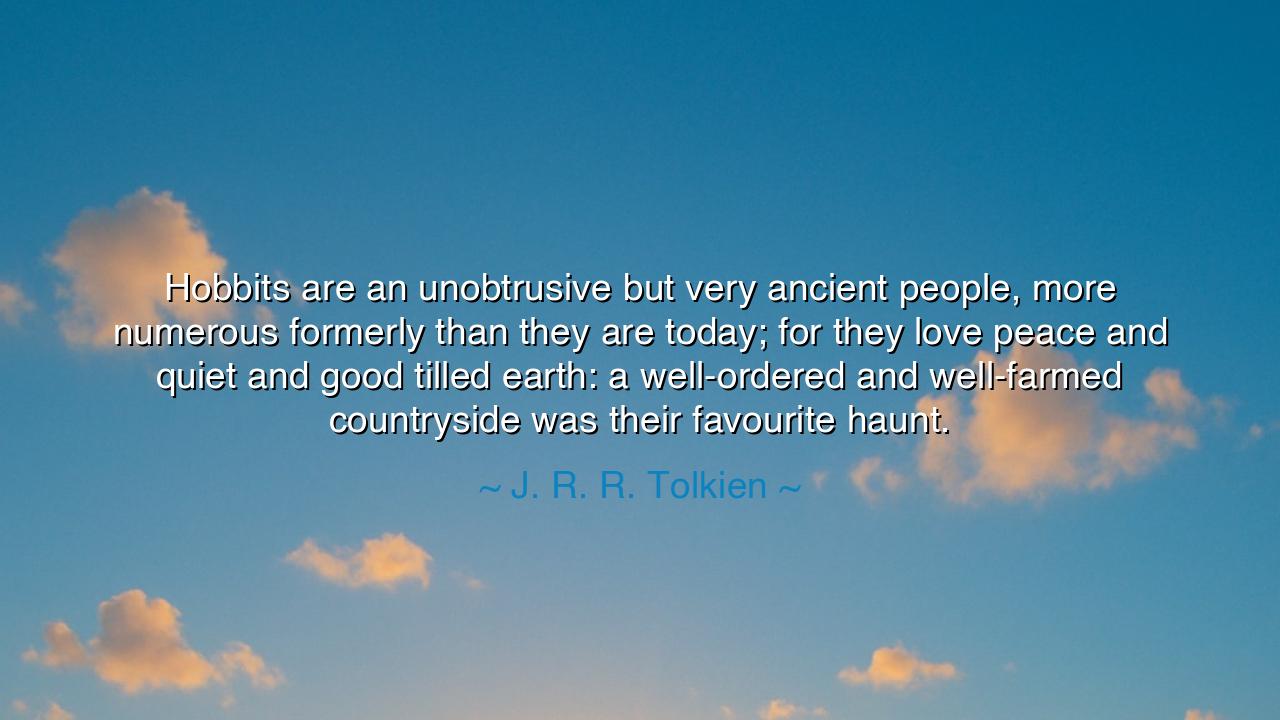
Hobbits are an unobtrusive but very ancient people, more numerous
Hobbits are an unobtrusive but very ancient people, more numerous formerly than they are today; for they love peace and quiet and good tilled earth: a well-ordered and well-farmed countryside was their favourite haunt.






Hear now the words of J. R. R. Tolkien, master of myth and maker of worlds, who wrote: “Hobbits are an unobtrusive but very ancient people, more numerous formerly than they are today; for they love peace and quiet and good tilled earth: a well-ordered and well-farmed countryside was their favourite haunt.” Though these words speak of the small and humble folk of Middle-earth, they carry within them a message for all generations — a reminder of the beauty of simplicity, the dignity of labor, and the quiet strength found in living close to the earth. Beneath the surface of fantasy lies the reflection of truth, drawn from the deep well of human history.
The Hobbits, in Tolkien’s world, stand as symbols of the forgotten virtues — contentment, modesty, and harmony with nature. They are the keepers of the old ways, lovers of hearth and field, who find joy not in conquest or renown, but in peace and good earth. They represent the eternal rhythm of sowing and reaping, of labor made holy through love. Their “well-ordered and well-farmed countryside” is more than a landscape; it is a way of being — a world where order, decency, and care form the roots of happiness. In their gardens and hills, Tolkien painted the heart of an age before the noise of industry drowned the song of the land.
The origin of this vision lies in Tolkien’s own youth. Born in South Africa but raised in the quiet countryside of Sarehole, England, he grew amidst meadows and mills, beneath skies unspoiled by smoke. That world, gentle and green, was the seed of the Shire — the homeland of the Hobbits. But when the fires of the Industrial Revolution spread across England, Tolkien watched those meadows blacken and vanish. The mills multiplied; the earth grew weary. In that loss, he conceived the contrast that would define his legend: the small folk who loved the simple and the good, standing against the powers of greed and ruin. Thus, this quote is both a description and a lament — a tribute to the quiet folk of the earth and a warning against forgetting them.
To “love peace and quiet” in a world of ambition is no small courage. The Hobbits’ strength lies not in might or cunning, but in their refusal to be consumed by the hunger for more. In this, they resemble the great figures of history who have chosen the humble path and changed the world by it. Consider George Washington, who, after victory in war and power in leadership, relinquished both to return to his farm at Mount Vernon. Like a Hobbit, he sought not dominion, but the steadiness of the soil. He knew, as Tolkien knew, that the well-tilled earth gives more lasting peace than any throne.
And yet, Tolkien’s words also speak to a fading truth — that such people were “more numerous formerly than they are today.” The world, in its rush for speed and profit, has forgotten the value of slowness, of silence, of rootedness. The fields give way to metal and stone; the rhythms of the plow are replaced by the pulse of machines. But still, there are those who, like Hobbits, tend their gardens, love their families, and find contentment not in conquest but in care. They may seem unobtrusive, but they are the quiet guardians of balance in a restless age. Theirs is a wisdom that endures when empires crumble.
From the Hobbits, we learn that greatness need not be loud. True heroism begins in the heart that cherishes peace, not in the sword that seeks war. When the storms of the world gather, it is often the smallest hands — the unnoticed, the humble — that preserve the light. Tolkien’s tale of Middle-earth is proof of this, for it was the Hobbits, not the kings, who carried the fate of the world upon their shoulders. Their strength came from love, from loyalty, and from the quiet courage born of a simple life well-lived.
So let this be your teaching, O child of the modern age: seek the peace of the tilled earth. Plant something that will outlive you. Cherish the stillness that the world would steal. Do not mistake obscurity for weakness, nor humility for lack of worth. The Hobbits remind us that those who dwell close to the soil dwell close to truth. For in every furrowed field, in every hearth that glows with kindness, there is a reflection of the Shire — a promise that as long as people love quietly, the world shall never lose its light.
Therefore, walk gently upon the earth. Live simply, work with care, and love deeply. Find joy in the small and sacred things — in the turning of the seasons, in the laughter of family, in the warmth of a home at peace. For the wisdom of the Hobbits is not fantasy — it is the echo of a truth long known to humankind: that happiness is not found in the noise of power, but in the stillness of a well-ordered and well-farmed life.






AAdministratorAdministrator
Welcome, honored guests. Please leave a comment, we will respond soon